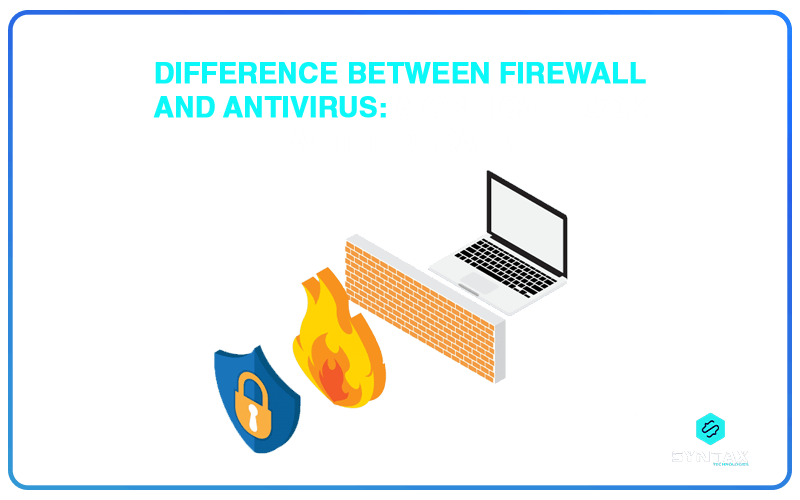?Cyber Security is a Shared Responsibility, and it Boils down to this: in Cyber Security, the more Systems we Secure, the more Secure we are? – Jeh Johnson
What would be your best defense in the face of an attack? I am sure your answer will depend on the nature of the attack as well as your understanding of the most appropriate defensive strategy which will be able to tackle the same.
The same idea applies to the domain of Cyber Security. Given the expansive nature of the field, Cyber Attacks and Threats can be of diverse types.
This means that it is important to have defensive mechanisms which will be suited to different forms of threatening situations. This is where the issue of Firewall vs. Antivirus becomes significant.
Even though both the instruments help in ensuring security; they help in addressing this issue through different means. Thus, the difference between Antivirus and Firewall is very much a real one and needs to be carefully looked at.
There are many different ways of tackling Cyber Attacks. Conducting Penetration Testing in order to detect possible flaws and vulnerabilities in the system is one of them.
If you wish to read more on the issue of Ethical Hacking, do read our blog on ?Learn Ethical Hacking from Scratch: Know How?
In this blog, we shall try to look at the difference between Firewall and Antivirus, by understanding the fundamental idea behind each of the concept. Moreover, in order to make things simpler, we shall try to address the issue of Antivirus vs. Firewall, through a synoptic comparison table.
What is Firewall?
A firewall operates as an obstacle between the Internet and a LAN (internal network and incoming traffic from external sources).
It operates on the boundaries of a network, supervising network traffic and thereby blocking malicious traffic in the form of malware, viruses, worms and so on.
A firewall particularly examines incoming data packets to decide whether they should be allowed through or not.
Firewalls serve as a comprehensive form of Cyber protection, which can cover a network of computer systems along with the whole infrastructure and configuration by erecting a barrier against possible attacks.
There are three common types of firewalls:
- Proxy Firewalls/Application Gateway: Network traffic is filtered at the Application level
- Packet-filtering Firewalls/Screening Router: Packets are analyzed and are permitted to pass through a firewall only when they match an established security rule-set. This involves a packet filter mechanism.
- Stateful Multilayer Inspection (SMLI) Firewall: Packets are filtered at the Transport, Application and Network layers. Comparison is made with known trusted packets
Functions of Firewall
- Ensuring the Passage of Network Traffic from the Outside to the Inside and vice-versa through the Firewall
- Performs the task of Packet Filtering
- Detecting and Blocking attempts for Unauthorized Access
- Firewall protects against external and internal threats
- Safeguards and Prevents the Modification of Crucial Data
Advantages of Firewall
- Data Protection
- Keeps Hackers at Bay
- Firewall protects from both external threats and some internal threats.
- Hardware firewalls and software firewalls are available.
What is Antivirus?
Antivirus, also commonly known as antivirus software, is a software program installed in a system. It helps in dealing with different kinds of threats that might compromise the security of the network or the computer system.
Antivirus protects against internal threats like malware, worms, and viruses, spyware, Trojan horses, or any other malicious and suspicious entity that has the potential to undermine the security of the computer system.
Functions of Antivirus
- Detection: An antivirus performs the crucial role of identifying potential threats, viruses or even attempts being made to infect the system with malware.
- Identification: After detecting a particular virus, the antivirus tries to identify the kind, type and characteristics of the virus.
- Removal: By this function, the antivirus tries to remove the suspicious entity from the system. It seeks to remove and delete the infected file and consequently restore the original backup program/file.
Advantages of Antivirus
- It offers protection against viruses and other forms of malicious threats
- It helps in blocking susceptible ads and spam websites
- It helps in protecting personal sensitive information
- Antivirus can act as an important safeguard against the activities of hackers and cyber criminals
- Prevents the transmission of viruses through scanning of removable devices like USBs
- It acts as a police which scans all possible files which enters the system and blocks the infected ones
- It offers protection from spyware and phishing attacks
- It helps restricting activities on unauthorized websites which can be a potential getaway for Cyber Attacks
What is the Difference between Firewall and Antivirus?
- The issue of Antivirus vs. Firewall is the issue of Security vs. Inhibition
Firewalls help in regulating network traffic by way of observing it for possible detection of malicious viruses and other forms of threats. Firewalls also have mechanisms to detect and thwart potential routing attacks. However, vulnerabilities like IP spoofing can sometimes bypass it.
This is where the role of the antivirus becomes important. By way of scanning all new entrants into the system, antivirus helps in obliterating and further segregating all possible corrupt and infected files.
Moreover, firewalls simply block and inhibit cyber threats; antivirus deletes them for providing overall security.
- Difference between Antivirus and Firewall in terms of their Basic Concept
The fundamental idea behind a firewall as well as an antirvirus is to provide security. However, a firewall is essentially designed to safeguard private and public networks from possible security attacks and threats.
In contrast, an antivirus is a software program which protects the system essentially from internal threats.
- Variance in Purpose
The objective of an antivirus program is to detect/identify, scan, prevent/block and remove/delete infected and malicious programs/files.
The objective of firewall is the inspection of the flow of data from the Internet to the systems, in order to restrict any form of unauthorized access.
Firewall vs. Antivirus: A Look at the Comparison Table
In this section of the blog, we shall look at the difference between Firewall and Antivirus in a tabular format.
Conclusion
It is evident that the issue of Firewall vs. Antivirus is not necessarily of one against the other. It would be naive to suggest that one is essentially superior over the other in all respects.
Both the Cyber Security mechanisms serve different objectives and are meant to cater to different forms of security needs. Thus, the difference between Firewall and Antivirus is largely in terms of their fundamentals and the differing form of security that each of them provides.
The increasing sophistication of Cyber Attacks and Threats have only propelled the need to search for more and more advanced and robust means of Cyber defensive strategies. Moreover, the demand for Cyber experts is soaring across industries.
We, at Syntax Technologies, offer you the alluring chance to develop expertise of a Cyber Security expert and give your professional career a commendable push. Read more about our Cyber Security course here:




